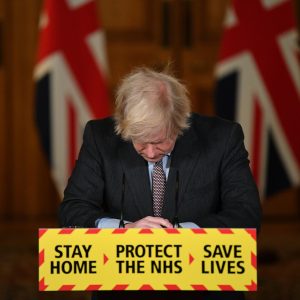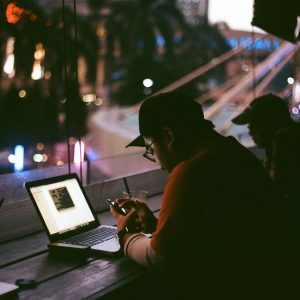6 May 2022 | Hungary, Opinion, Poland, Ruth's blog, United Kingdom, United States

Prime Minister Boris Johnson samples an Isle of Harris gin. Photo: Justin Tallis/PA Wire/PA Images
This week was election week in the UK and, as a former parliamentarian, you’d expect me to be writing about the joy of being able to express ourselves at the ballot box and the vital importance of democratic values when they seem so under attack at the moment in too many places to mention.
I love elections, I love the debate, I love speaking to people on their doorsteps and there is nothing like a successful election count for your party. I cherish the fact that I am lucky enough to live in a democracy, that typically my human rights are protected because my fellow citizens also believe that democracy is something to be protected. But voting is a means to an end – it allows us all to hold our politicians to account and to ensure that our core values are reflected in our government. This only works if you believe that your democratically elected government is going to stick to the rules and it’s that that I have been reflecting on for the last couple of weeks.
There are some conversations that keep coming back to you. That spark debate and lead you to question the status quo. Last month, I had a series of meetings where there was a recurring theme that did just that.
International norms and the rule of law, which underpin both our democratic states and our world order, are only relevant if state actors recognise them and that culturally we all acknowledge their necessity.
The moral authority of democratic countries is dependent on how they choose to apply the rule of law – both domestically and internationally. On whether they are prepared to defend core democratic values, even when inconvenient, on a national and international stage. It’s the application of these norms and rules which empower democratic states to challenge others when they break them. And the recurring message from my meetings was that there was no longer an acceptance that democratic states were prepared to uphold the rule of law – if it didn’t suit them. And therefore, we are losing our moral authority to intervene when others break the law.
Poland is being fined one million euros a day by the European Court of Justice for undermining its domestic judiciary. Rather than comply with the ruling, Poland has been happy to let the fine mount up – a proportion of its EU finding withheld to pay for it.
The European Commission is also cutting funding to Hungary for eroding legal standards in the EU.
The British Prime Minister has been fined for breaching his own Covid-19 regulations and, pre-pandemic, was found to have unlawfully suspended Parliament.
In the US we saw incitement by leading politicians to undermine a smooth transition of power after the last presidential election.
This would be dangerous at any time, but right now when Russia and China are both attempting to leverage their power and influence, invade and threaten their neighbours we have never needed to uphold our international norms more.
The leaders of our democratic nation states speak with a level of moral authority on a global stage because their voice is our voice, because they are seen to uphold our core values – and they can therefore challenge other world leaders when they cross the line. If our current global order is to survive it’s therefore imperative that our leaders uphold the law – whether it suits them or not.
The rule of law is the basis of the campaigns that Index runs. Our work is framed by Article 10 of the European Convention on Human Rights – that everyone has the right to freedom of expression. We demand that national states uphold the values espoused by the Universal Declaration of Human Rights. If our leaders aren’t upholding these values, then it’s not just their voices that are weakened but ours too.
My fear is that when international norms aren’t followed – when our leaders opt in and opt out of laws and norms they don’t like – then repressive regimes thrive and their citizens are the ones that suffer.
So, this is really a plea to all of us who are lucky enough to live in democratic societies – hold your leaders to account and make sure that they comply with the law – so that we all have the moral authority to hold the tyrants’ feet to the fire.
22 Apr 2022 | Afghanistan, China, France, Israel, Opinion, Palestine, Russia, Ruth's blog, Ukraine, United States
I regularly start my weekly blog with the exclamation “there is just too much news!” Too much horror and heartbreak and this week the assertion is all too true.
Russia has invaded a sovereign country and daily we are seeing evidence of war crimes on the continent of Europe; China is arresting yet more democracy activists on the flimsiest of excuses; there have been bombings targeting schools in Afghanistan; a neo-fascist is, yet again, in the final run-off in the French Presidential elections; there are riots in Sweden against the far-right with dozens hurt; people are starving in Shanghai under Covid-19 restrictions; there is active conflict again in Jerusalem, with over 150 Palestinians hurt in clashes after a series of terror attacks targeting Israelis in recent weeks; another video of a black man being fatally shot by the police has emerged in the US – Patrick Lyoya was killed, while being held on the ground, defenceless, on 14 April and riots have followed in Michigan.
Our team at Index is working on every one of these news stories. We work with people on the ground, and we commission dissidents and writers, in country, to give us a first-hand account. In the twenty-first century we can speak to people in every corner of the globe, as events are happening, because of the internet and the social media platforms which afford us all a level of protection because of end-to-end encryption. We work with people on the ground who would be arrested, tortured, or even killed because they want to share their experiences with the world. They want the world to know what is happening to them and to their communities. They are on the frontline in the perpetual fight for our democratic right to freedom of expression. They are vulnerable because of who they are and what they want to share with us, whether that’s their writings, their opinions or their art.
They are brave and inspirational and determined to stand up for what is right. For as long as they want to tell their stories there is a moral onus for us to listen to them.
Which brings me to the current proposals to regulate our online lives currently being progressed in the European Union and in the United Kingdom. In Europe, today (Friday) the final negotiations on the substance of the Digital Services Act are underway and, in the UK, the Online Safety Bill began its parliamentary journey on Tuesday. Index is working actively with partners to try and mitigate the worst aspects of both pieces of legislation and we were in Brussels this week to make the case for additional protections for freedom of speech. Our overriding goal is to make sure that our access to those brave dissidents is protected and that our rights to discuss the detail of these horrors are protected. To make sure that while legislators are trying to ‘protect’ us online they don’t end up inadvertently silencing us.
Index advocates for free expression within the protections afforded to us by the European Convention on Human Rights. There is no right not be offended. There is no right not to see things online, or in real life, that will upset you. Of course, we all want to protect each other from seeing the worst aspects of human life – that’s an admirable aspiration but it isn’t the grounds for making new law. In fact, it’s the exact opposite – legally we have protected freedom of expression, it’s a fundamental right. I have written before about our concerns regarding online regulation and in the coming months I’ll be writing extensively on it – but we start with the basic principle – what is legal to say should be legal to type. And that should be the case whatever any new legislation seeks to amend.
21 Jan 2022 | Afghanistan, China, Kazakhstan, Opinion, Russia, Ruth's blog, United Kingdom, United States

UK Prime Minister Boris Johnson looks down at the podium during a media briefing in Downing Street. Photo: Justin Tallis/PA Wire/PA Images
It should surprise no-one that I am a political geek. I love politics. I love the cut and thrust of debate. I love the moments of high drama and the intrigue. Most of all I love the fact that genuine good can be done. That people’s lives can be made just a little easier by the power of our collective democracy.
So you’d assume that I would have relished the events of the UK Parliament this week. And I’d be lying if I didn’t admit to being completely obsessed with the minutiae of the debate around Partygate and the drama of the precarious position of the Rt Hon Boris Johnson MP as he seeks to survive the biggest political crisis of his premiership.
But I’m also angry. The British Government has been distracted for weeks, caught in a political crisis of their own making about whether or not the Prime Minister knowingly broke his own Covid-19 regulations. While the political establishment awaits a report from a senior civil servant to clarify what was, or wasn’t, happening behind the doors of Number 10, important issues are being sidelined or ignored and people are suffering.
This week the British Parliament held vital debates on the genocide of the Uighurs and the use of the British legal system to silence activists and journalists. Both debates passed broadly without comment or wider notice.
The Russian Federation is threatening the sovereign status of a democratic ally, Ukraine, on an hourly basis.
Biden has marked his first year in office.
52,581 people have died of Covid.
Protestors in Kazakhstan are being threatened with death if they continue to protest against the government, with 10,000 already arrested and 225 killed by the authorities.
23 million people in Afghanistan are experiencing extreme hunger as the Taliban starts attacking women activists.
These are some of the heartbreaking and terrifying realities which are happening around the world. These are the issues that should have dominated our news agenda this week, along with a cost of living crisis, a plan to deliver net zero and attacks on free expression around the world.
Index will continue to fight for these issues to be heard. For the voices of the persecuted to be recognised. While some of our leaders focus on domestic intrigue we’ll keep fighting for those that don’t have a voice.
15 Dec 2021 | Magazine, News, United States, Volume 50.04 Winter 2021, Volume 50.04 Winter 2021 Extras
Ashley Gjøvik knew things had become serious when she received an email on 9 September 2021 from Apple’s Threat Assessment and Workplace Violence team asking her to discuss a “sensitive intellectual property matter”.
Gjøvik, 35, had been raising concerns about toxic waste under her office for six months, and had become known as “The Apple Whistleblower”, but this was the first time she had been contacted by this scary-sounding unit.
She emailed back to say she was “happy to help” but with one condition: everything had to be done via email. “I wanted everything in writing so they are not misrepresenting me, they’re not trying to gaslight and intimidate me.”
But she never discovered what the sensitive IP matter was because she was fired for failing to co-operate with the investigation, despite repeated attempts to express her willingness to do so. The letter terminating her employment accused her of disclosing “confidential product-related information” but did not go into detail.
By the time she was sacked, Gjøvik had become a fearsome employee-activist conducting a full-scale campaign over hazardous waste in Silicon Valley. She had gone public on workplace harassment, Apple’s surveillance of employees and its culture of secrecy. But it all began when she started to raise perfectly regular concerns about her own safety and that of her fellow workers.
In February 2020, Gjøvik had moved into a new apartment in Santa Clara, California, only a short drive from her office in nearby Sunnyvale. On the face of it, Gjøvik had an enviable job as a senior engineering programme manager (“We work behind the scenes to make sure everything gets done. We make sure the products actually get out the door”).
She worked hard in a stressful environment – while training to be a lawyer in her spare time – but prided herself on her resilience. Despite the punishing hours of work and study, she was in good health. However, within days of moving into the apartment, she started experiencing dizzy spells.
Waking up choking
“I’m starting to have chest pain and palpitations and I’m like, what the hell is going on?” she told Index. She went to see about 20 different doctors and even attended a nervous system clinic at Stanford University. “My blood pressure’s doing crazy stuff. My heart’s doing crazy stuff, but no one knows why. I’m getting all these rashes. No one knows why. I have a growth on my thyroid… all this weird stuff happening all at once.”
By the end of February, she was already so ill that she could barely function: “I’m passing out sitting. I can’t focus. I have to lay down all the time. My body starts going nuts.”
Before the pandemic hit, Gjøvik was already working from home and by March she was signed off on a medical leave of absence.
As the months passed and she became sicker and sicker, Gjøvik realised she was waking regularly at 3am feeling as if she was choking. She began to wonder if her failing health had anything to do with the apartment itself. By chance, one day in September 2020, she was talking to a friend whose husband was an engineer and he suggested she check the carbon monoxide levels.

Ashley Gjøvik has raised concerns about toxic pollution
She discovered a spike in volatile organic compounds (VOCs) in the early hours of the morning. These VOCs, essentially toxic gases, are present in everyday household products such as disinfectants, aerosols, pesticides and paints. But they are not usually found at levels dangerous to people’s health. Nor do they tend to spike at particular times without a cause such as cooking or cleaning.
Gjøvik immediately set about doing some serious detective work. When she looked up the environmental assessment report on her apartment she saw it contained a 40-page section entitled “hazardous waste”. Silicon Valley was favoured by defence contractors before it became the centre of America’s tech miracle and was once dominated by factories and heavy industry.
It turned out the apartment was built on a so-called Superfund site, a designation from the US Environmental Protection Agency. Such sites demand a special industrial clean-up before people can live and work in the area, involving deep excavation and “backfilling” with concrete. If this is not carried out properly the risk is that vapour from toxic underground plumes can escape into the atmosphere (and people’s homes).
Gjøvik discovered that so-called “vapour intrusion” can occur through sewer pipes, plumbing, sprinkler systems and air conditioning. She pestered her landlord and the fire department for diagrams of all the pipes in the building to isolate the source. To this day she does not know exactly why the levels of toxic gas spiked at 3am, but she believes it is possible that it had something to do with the automated air conditioning or the flushing of the fire sprinklers.
“The apartment block had 1,800 units with two or three bedrooms. So, thousands of people could be sick and not know it. I literally could not sleep at night. I had to get the word out,” said Gjøvik.
She raised her concerns with the California and Federal EPA as well the state and county departments of environmental health and the local water boards. She moved out of the apartment later that month and all the symptoms stopped immediately. She was even able to return to work.
Alarm bells
By the spring of 2021, Gjøvik had become an armchair expert on Superfunds, vapour intrusion and the science of toxic groundwater plumes. So when she saw an email from Apple’s environmental health and safety team on 17 March notifying staff of “a large-scale project” across the company’s building portfolio to carry out vapour intrusion testing, alarm bells started ringing.
The building, a slick glass office with an octagonal atrium, had been leased by Apple since 2015 and was known to be built on the site of a factory owned by TRW Microwave Inc, a notorious Superfund polluter. Gjøvik found a 2016 report of vapour intrusion in homes next to the office and a 2019 lawsuit by the EPA against the polluters. The real concern was the presence of trichloroethylene (TCE), a carcinogen associated with kidney cancer.
Gjøvik was keen to know if the new testing was the result of a new vapour intrusion incident and asked if any testing had been carried out since Apple employees had moved in six years earlier. She was initially told not to discuss her concerns with anyone except her manager, the HR department and environmental health and safety so as not to cause panic.
But already Gjøvik was building a reputation as a toxic waste whistleblower through the campaign around her Santa Clara apartment. She had written an article in the local paper, San Francisco Bay View, entitled “I thought I was dying: My apartment was built on toxic waste”. She had also brokered a meeting with California Senate member Bob Wieckowsi to discuss her concerns.
In mid-April she visited experts in public health and occupational medicine at University of California San Francisco and it became increasingly clear that it would be difficult to separate her concerns about her former apartment from those about her office.
Throughout the spring and summer of 2021, Gjøvik put pressure on Apple to reveal why the new testing was being carried out and whether it was connected with cracks that had appeared in the floor of her office. She also urged her employers to test the air in the office before the cracks were repaired to establish whether workers had been put at risk since 2015.
Apple was planning for the post-pandemic return to work, but Gjøvik said she felt it was unsafe for her and her colleagues to return to work without assurances about the toxic waste under their office. Some co-workers had been given special permission to return to work as early as May 2020.
The relationship with Apple had almost completely broken down by this point. The company did begin an investigation into Gjøvik’s complaints of bullying and sexual harassment, but she believes this simply sparked further intimidation. In a last-ditch attempt to force Apple to engage publicly, she began live-tweeting her interactions with the company and eventually, in August, she was suspended on indefinite administrative leave.
In a statement on the case to the tech website The Verge, Apple spokesperson Josh Rosenstock said: “We are and have always been deeply committed to creating and maintaining a positive and inclusive workplace. We take all concerns seriously and we thoroughly investigate whenever a concern is raised and, out of respect for the privacy of any individuals involved, we do not discuss specific employee matters.”
But Gjøvik is refusing to roll over: “I want to document it and show the world this is what Apple did: You poisoned me physically, mentally, spiritually. Fuck you guys.”
Ashley Gjøvik has become a nightmare for Apple, which prides itself on its employees’ loyalty. Following the classic whistleblower playbook, rather than address the issues she raised about toxic waste, the company has taken the decision to shoot the messenger.




